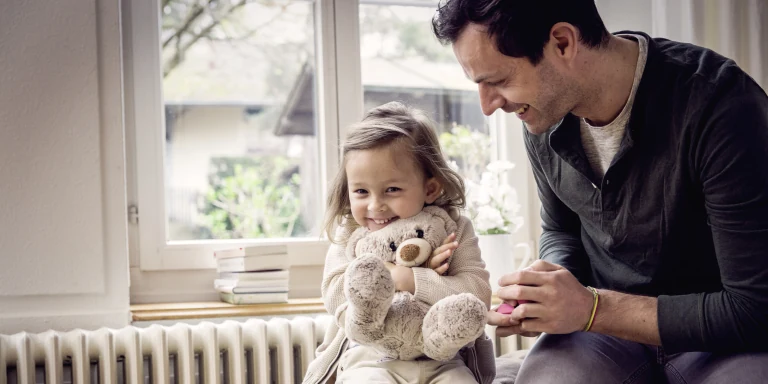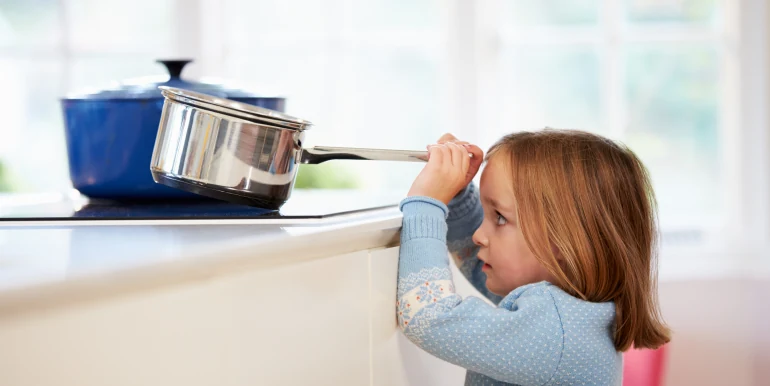
Overview of childhood diseases
What are the most common childhood diseases? Which childhood disease causes rosy cheeks? Which childhood disease causes white blisters on the tongue? Find out about the symptoms of today’s common childhood diseases from our list.
Which common symptoms are associated with childhood diseases?
Getting ill is a big part of being a child. Where symptoms are experienced, it’s often one of the classic childhood diseases caused by viruses, like hand, foot and mouth disease, or bacteria, like whooping cough. Almost all children experience these at one point or another.
Pay attention to the symptoms, because they provide clues as to which illness it might be. Your child may need medical assistance depending on the situation.
Childhood diseases with rashes
Rashes in children are often a clear indication of one of the following childhood diseases. They vary in appearance and severity. Childhood diseases with rashes include:
- Measles: Measles is associated with the appearance of red, patch-like spots. The irregular spots spread over the face and all over the body. Red cheeks are a characteristic sign. The palms of the hands and soles of the feet remain unaffected. This childhood disease also causes white spots on the oral mucosa.
- Rubella: This childhood disease may result in a mild rash with small bright red spots that don’t merge together like measles. The slightly raised spots appear mainly on the face. However, a more typical symptom of rubella is the swelling of the lymph glands in the neck and behind the ears. Rubella can also be asymptomatic.
- Fifth disease: This childhood disease initially becomes apparent through the appearance of a rash on the face. The rash is butterfly-shaped and large on both cheeks. After some time, the disease causes not only red cheeks, but also a blotchy rash on the arms, shoulders, legs, thighs and buttocks.
- Chickenpox: This childhood disease causes red dots, usually on the head at first, then on the whole body, but especially on the torso. They itch and develop into fluid-filled blisters that eventually crust over. There may also be blisters in the mouth. The pustules are generally very itchy.
- Hand, foot and mouth disease: This childhood disease is characterised by fluid-filled blisters in and around the mouth, as well as red spots and nodules on the palms and soles of the feet.
- Scarlet fever: The red, pin-sized spots are slightly raised and usually appear between the second and fourth day. They first appear in the armpits, on the chest and on the inner thighs, before spreading over the entire body. Only the characteristic triangle around the mouth and chin remains untouched. The rash in cases of scarlet fever is not itchy. Another classic symptom is the raspberry-red tongue, which is initially covered with white. The throat is inflamed and red or blotchy.
- Three-day fever: With three-day fever the rash does not appear until after the fever has subsided. The rash consists of small, fine, pinkish-red spots, mainly on the torso and rarely on the face. The rash usually isn’t itchy and often goes away within a few hours or days without further complications.
Childhood diseases with fever
Fever is a common symptom in various childhood diseases and often the first indication that something is going on in your child’s body. It signals that the immune system is actively fighting an infection. These childhood diseases are associated with fever:
- Measles
- Mumps
- Rubella
- Fifth disease
- Chickenpox
- Hand, foot and mouth disease
- Scarlet fever
- Three-day fever
- Diphtheria
Important: some childhood diseases cause high fever. These include scarlet fever, three-day fever, measles and mumps.
Childhood diseases with a cough, sore throat and runny nose
The respiratory tract may also be affected and requires special attention. The symptoms range from coughing and a runny nose to more serious complications.
- Measles: Measles is often initially associated with flu-like symptoms such as a dry cough, sore throat, fever, runny nose and inflamed eyes. After a fever-free interval, the second episode of the disease follows – with a rash and renewed fever of around 39 degrees centigrade.
- Rubella: Mild respiratory symptoms such as coughing, a runny nose and mild headache may occur, but are not as pronounced as they are in measles. In addition to the rash with bright red spots, swollen lymph nodes in the neck and throat area are classic rubella symptoms.
- Chickenpox: Chickenpox causes respiratory symptoms only occasionally. In rare cases, complications such as pneumonia can also occur in children.
- Hand, foot and mouth disease: This childhood disease can cause a sore throat in addition to fever and painful blisters.
- Scarlet fever: The first signs of scarlet fever include a sore throat and difficulty swallowing. The inflamed throat is red, the tonsils and oral mucosa become blotchy, and the tongue has a white coating. A non-itchy rash may also follow from the second day onwards.
- Whooping cough: After mild cold symptoms with a runny nose, dry cough and weakness at the beginning, spasmodic coughing fits and vomiting occur. Affected children also wheeze while they inhale. For infants, coughing fits are life-threatening, as they can lead to respiratory arrest.
- Diphtheria: This bacterial infectious disease primarily affects the throat or skin. Pharyngeal diphtheria affects the respiratory tract. There is a sore throat, difficulty swallowing, hoarseness, a cough, fever and swollen cervical lymph nodes. Breathing and swallowing become very difficult. In severe cases, serious damage to the heart, nerves, kidneys and liver is possible.
Childhood diseases with gastrointestinal symptoms
Gastrointestinal complaints in children may be associated with various childhood diseases. Diagnosis is dependent on other factors in the overall condition and what other symptoms occur:
- Hand, foot and mouth disease: This childhood disease with its typical rash on the hands and feet may be accompanied by nausea, diarrhoea, fever and dizziness.
- Scarlet fever: This illness can cause nausea and abdominal pain in addition to the initial sore throat, flushed cheeks and fever symptoms.
- Three-day fever: This childhood disease may be associated with diarrhoea and vomiting in addition to the high fever.
- Whooping cough: The intense cough in whooping cough can be so severe that it causes vomiting.
How are typical childhood diseases transmitted?
The diseases talked about here are infectious diseases. The bacteria or viruses are transmitted via droplet infection. So it is possible for your child to get infected while playing with other children or at school. To prevent your child from infecting other children, they should stay at home if they have fever or any other symptoms. How long depends on the disease and treatment. Talk to your paediatrician about when your child can go back to daycare, nursery or school.
Childhood diseases can also occur in adulthood and are then often more severe, especially chickenpox, measles and rubella. The risk of complications is also higher. It is best to talk to your doctor or health care professional about the possibility of vaccination if you have not been affected by any of the common childhood diseases or have not yet been vaccinated. This is especially important before pregnancy, as diseases such as rubella or fifth disease can harm the baby.
This list of childhood disease symptoms is by no means exhaustive. It serves only as starting point for diagnosis. Contact your paediatrician to clarify your child’s symptoms, especially if your child’s symptoms do not improve, worsen, or additional symptoms appear.

The expert provided the editorial team with advice and input for this article. Julia Pieh (doctorate in pharmacy and toxicology, pharmacist, naturopath) works in the Helsana Health Consultation Service.


Newsletter
Find out more about current health issues every month and get all the information you need about our attractive offers from all Helsana Group companies * delivered by e-mail to read whenever it suits you. Our newsletter is free of charge and you can sign up here:
We did not receive your information. Please try again later.
* The Helsana Group comprises Helsana Insurance Company Ltd, Helsana Supplementary Insurances Ltd and Helsana Accidents Ltd.